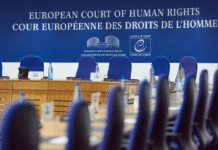Turkish authorities have launched an investigation into a group of dissidents who staged a peaceful demonstration in June in Copenhagen, raising fresh concerns about Turkey’s crackdown on the faith-based Gülen movement since a coup attempt in 2016.
According to classified documents obtained by the Stockholm Center for Freedom (SCF), the counterterrorism department of Turkish National Police (Emniyet Genel Müdürlüğü) used photos shared on social media to identify individuals who participated in the demonstration in Copenhagen on June 25. Turkish authorities reportedly employed intelligence-gathering tools to profile and categorize the demonstrators. The resulting data was subsequently transmitted to public prosecutors’ offices in multiple provinces across Turkey, raising serious concerns about the extraterritorial surveillance and criminalization of dissent abroad.
According to the documents, public prosecutors in Turkey have initiated separate criminal investigations into each individual identified in photos shared on social media from the Copenhagen demonstration.
Legal document signed by public prosecutor Mustafa Özyürek:
The demonstration in Copenhagen was held in parallel with a major gathering on June 25 that brought together nearly 5,000 Turkish expatriates, victims of a crackdown following the coup attempt, human rights advocates and lawmakers outside the Council of Europe (CoE) headquarters in Strasbourg. The protest aimed to draw international attention to Turkey’s persistent refusal to implement binding rulings issued by the European Court of Human Rights (ECtHR), particularly in cases involving political prisoners, arbitrary detentions and violations of due process.
The protest, the fourth of similar protests in 2022, 2023 and 2024, was held amid growing frustration with the CoE’s failure to hold Turkey accountable for continued defiance of the ECtHR judgments in landmark cases such as those of philanthropist Osman Kavala, Kurdish politician Selahattin Demirtaş and former teacher Yüksel Yalçınkaya.
In September 2023 the Strasbourg court delivered a landmark judgment faulting Turkey over the conviction of former teacher Yalçınkaya due to his alleged links to the faith-based Gülen movement, which was demonstrated through his labor union membership, banking transactions and use of the ByLock messaging application.
Yalçınkaya was sentenced to more than six years in prison largely for having used ByLock, an encrypted messaging app that Turkish authorities claim was exclusively used by members of the Gülen movement. The ECtHR said that mere use of the app, along with membership in a now-banned teachers’ union and an educational association, did not meet the threshold for terrorism-related charges and that Turkish courts had relied on broad, retroactive interpretations of the law.
Turkish President Recep Tayyip Erdoğan has been targeting followers of the Gülen movement, inspired by the late Muslim cleric Fethullah Gülen, since corruption investigations in December 2013 implicated him as well as some members of his family and inner circle.
Dismissing the investigations as a Gülenist coup and a conspiracy against his government, Erdoğan began to target the movement’s members. He designated the movement as a terrorist organization in May 2016 and intensified the crackdown on it following the abortive putsch in July of the same year that he accused Gülen of masterminding. The movement strongly denies involvement in the coup attempt or any terrorist activity.
In addition to the thousands who were jailed, scores of other Gülen movement followers had to flee Turkey to avoid the government crackdown.
















